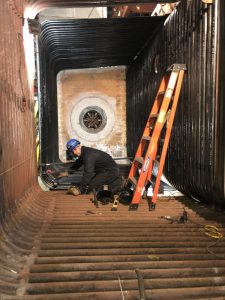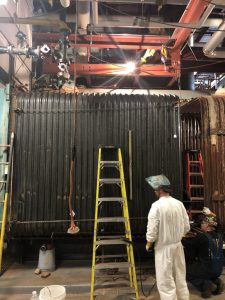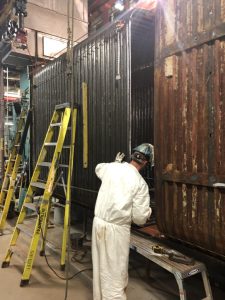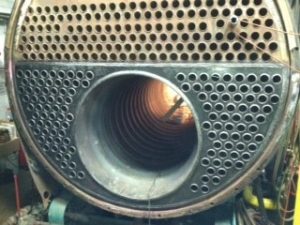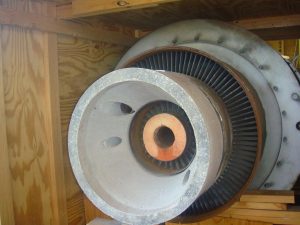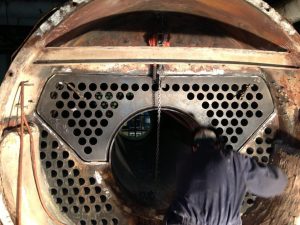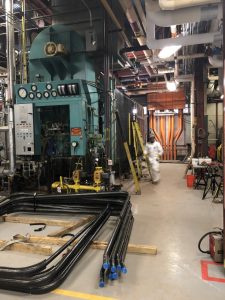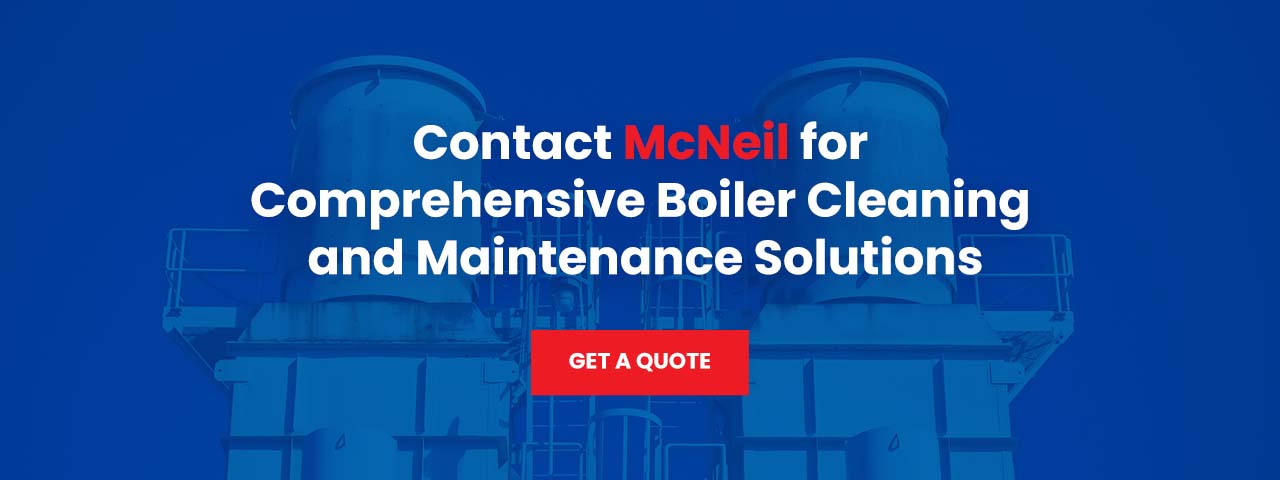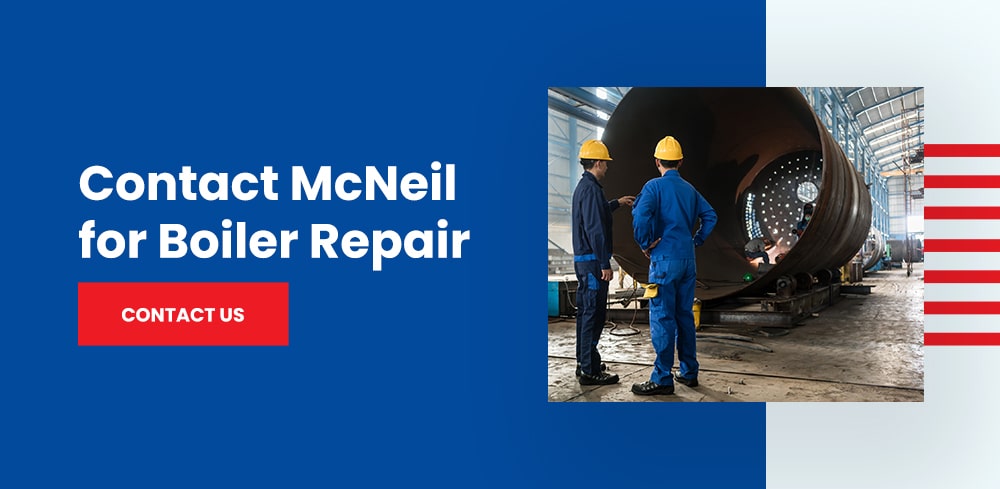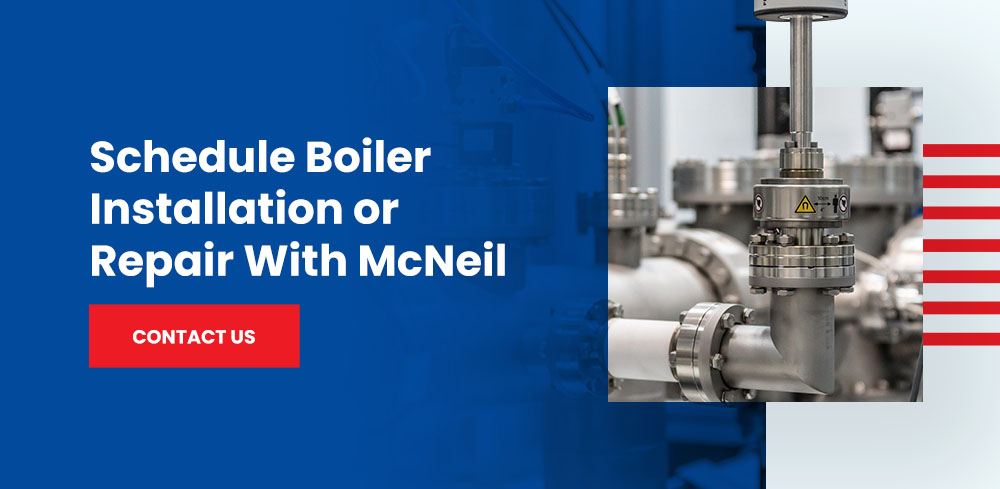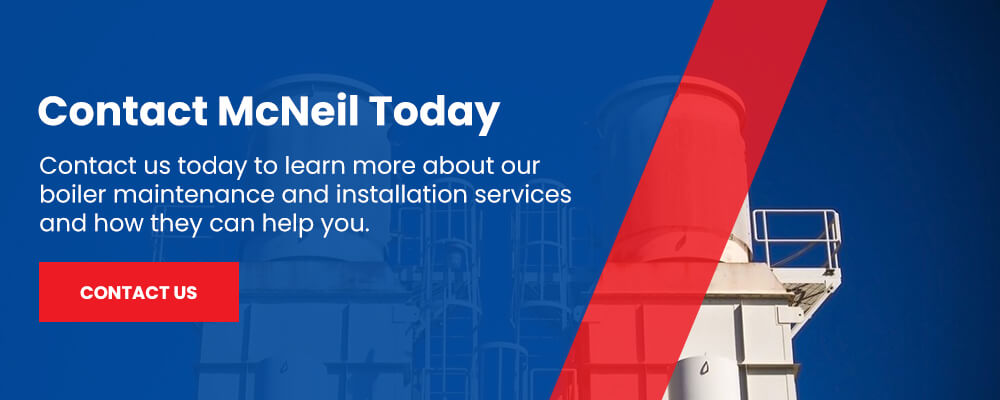Boiler Cleaning Tips
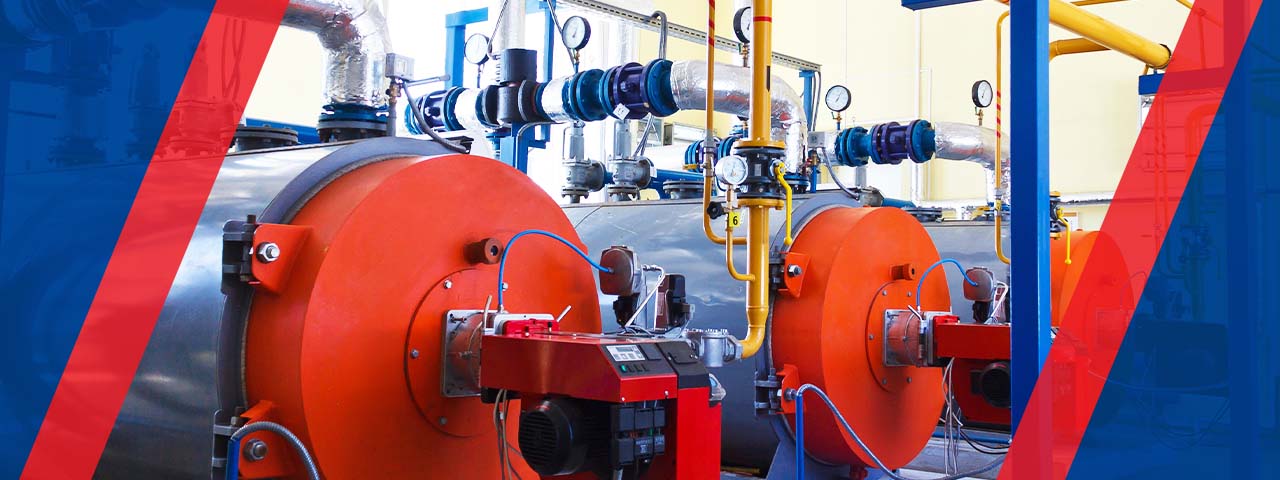
Scale, mineral, ash and soot buildup is normal for any industrial boiler system, but if it persists for too long, it can make the boiler work harder than necessary. These contaminants create slag deposits that stick to boiler surfaces and reduce heat transfer, reducing efficiency while increasing costs.
Cleaning your boiler ensures it works efficiently while minimizing fuel and operational costs. A boiler free of buildup can offer long-lasting performance that ensures smooth workflows for your facility
What is the best method for cleaning a boiler? Check out these boiler cleaning tips to discover the best ways to maintain your boiler and maximize your investment.
1. Contact a Professional
Your boiler is critical to your operations, so it needs specialized care to ensure it remains safe and operational. An experienced professional can clean your equipment quickly and efficiently while protecting it throughout the process. Professionals have extensive experience working with all types of boilers for different industries, so they will know how to clean yours effectively.
An expert boiler cleaning company will also understand proper procedures for handling chemicals and disposing of contaminants. A professional can perform the deep cleaning processes your boiler needs to operate at peak performance with minimal risks of malfunctions or damage.
2. Turn Off Your Boiler
Before the cleaning process begins, you must turn off your boiler — a simple and straightforward step, but one that is absolutely necessary. The boiler must be completely cool to prevent damage and allow for safe and easy cleaning. Follow the manufacturer’s instructions for shutdown procedures to ensure the boiler is properly prepared for cleaning.
If you plan to clean your main boiler, be prepared to use backup or rental boilers to ensure uninterrupted operations for your facility. If backup boilers are unavailable, schedule cleaning during planned downtime or low-demand periods so you can minimize disruptions.
3. Use the Right Cleaning Methods
The best method for cleaning a boiler depends on the type you have, your water quality and how often you use your boiler. These factors will affect how much buildup you need to remove and the type of cleaning that will best eradicate contaminants.
Boiler cleaning methods include:
- Chemical cleaning: Specialized industrial boiler cleaning chemicals can dissolve deposits, such as scale and sludge, along internal boiler tubes. Follow the manufacturer’s guidelines to use appropriate chemicals and procedures to protect the boiler throughout the process. With the right water treatment for your boiler, you can optimize energy efficiency while lowering costs.
- Mechanical cleaning: These techniques focus on dislodging and physically removing buildup. Professionals may use wire brushes and scrapers to scrub surfaces and vacuums or compressed air to clear debris.
Start by removing ash and soot from the boiler, and then use chemical or mechanical cleaning techniques to clean the boiler’s interior. Ensure every component is thoroughly cleaned, from pipes to combustion chambers. Flush the system with clean water to remove any remaining chemicals or debris.
4. Perform Thorough Inspections
Clean boiler surfaces offer the perfect opportunity for a comprehensive inspection. With a clear view of your boiler components, you can determine if any part needs additional maintenance before you run your boiler system again.
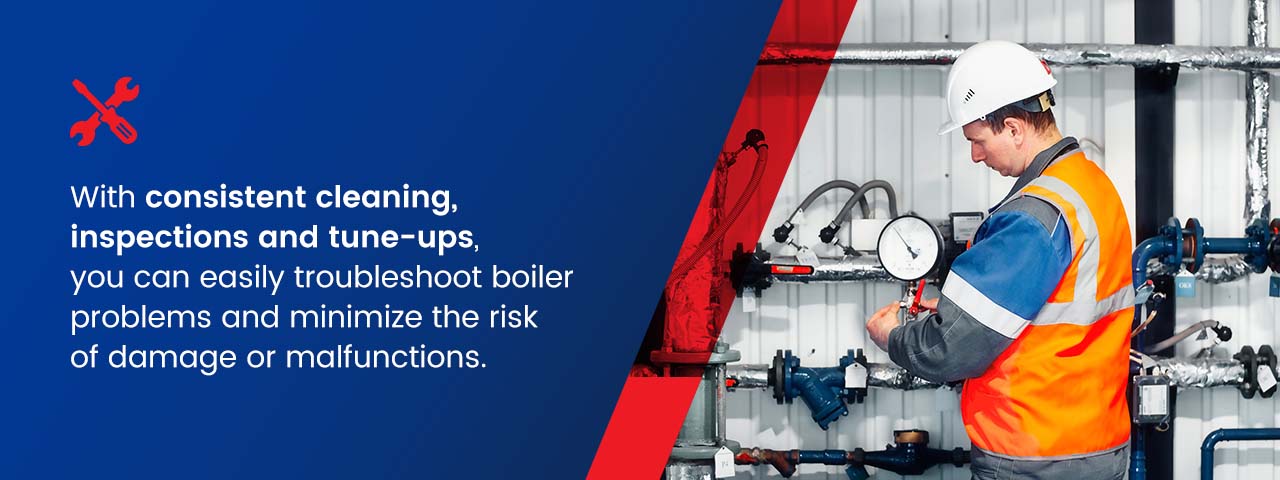
Performing tests along with inspections will help ensure the boiler is functioning properly and ready to return to operation. Once your boiler has passed inspection, you can reassemble the components and restart the system.
5. Follow a Regular Maintenance Schedule
A regular maintenance program promotes your boiler’s longevity and productivity. With consistent cleaning, inspections and tune-ups, you can easily troubleshoot boiler problems and minimize the risk of damage or malfunctions.
When conducting maintenance, it is best to use a maintenance checklist with a variety of boiler maintenance tips for daily, weekly, monthly and yearly tasks. A comprehensive checklist ensures you cover every aspect of cleaning and maintaining your boiler to promote optimal performance.
Common Questions About Industrial Boiler Cleaning
Review these common questions to find additional tips for taking care of your critical boiler system.
How Do You Flush Sediment Out of a Boiler?
To flush the sediment out of your boiler, you will first need to prepare the following supplies:
- A hose: Attaching the hose to the drain valve helps create a powerful water flow out from your boiler.
- A bucket: You will need a container, such as a bucket, to catch and assess the water from your boiler.
With these supplies, you can follow these steps to clean out your commercial boiler:
- Attach a hose to the drain valve and place a container under the valve.
- Open the valve and let the water drain into the container.
- Close the drain valve once the boiler is empty, and dump the water from the container.
- Fill the boiler with clean water.
- Circulate the water throughout the boiler system, then drain it into the container.
- If the water still has sediment or debris, repeat the flushing cycle until the water is clear.
- Close the drain valve and turn off the boiler.
If your boiler has a built-in flush valve, follow the manufacturer’s instructions to use the valve properly. Be careful not to overfill the boiler during the flushing process to prevent damage.
How Often Should Boilers Be Cleaned?
Boilers require professional cleaning at least once a year to promote long-lasting performance. Your boiler may need more frequent cleanings depending on how often you use it and your water quality. The more frequently you use your boiler or the poorer your feedwater quality, the more cleanings your boiler will need throughout the year.
You can evaluate your boiler’s condition by taking a boiler tube sample. Measuring the deposit amount and analyzing the composition of the deposits can tell you if your boiler needs to be cleaned. If you notice issues with your boiler, such as inefficiencies or leaks, they may also be signs that it is time for a cleaning.
Contact McNeil for Comprehensive Boiler Cleaning and Maintenance Solutions
When you need an experienced professional to handle your boiler cleaning requirements, choose McNeil. Our experts have extensive experience serving clients throughout industries, so you can trust us to understand your boiler needs and resolve your concerns.
We clean the entire machine to remove contamination and promote efficient performance that keeps your costs low. We also offer annual steam boiler maintenance, boiler inspections and comprehensive boiler repair services to ensure your equipment gives you the uninterrupted production your facility requires.
Ready to get started with our solutions? Contact us through our form, or call us at 800-722-5538 today to learn more about our boiler cleaning services.
Industrial Boiler Troubleshooting
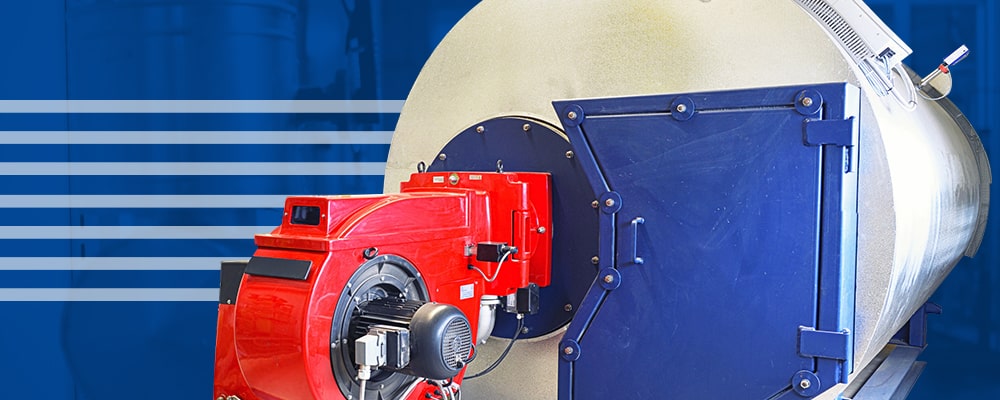
Any industry that utilizes boilers can experience issues that lead to boiler problems, bringing operations to a standstill. All boilers are likely to run into issues from time to time. Knowing what common problems can occur, how to troubleshoot them and what your next steps are can help keep your boiler in good condition.
Common Boiler Problems
While boilers are durable industrial machines, they can still break down if a problem occurs. Responding to boiler problems quickly is essential to minimize damage and save money on repairs. Below are a few of the most common boiler problems you could encounter.
1. Leaking Water
Water leaking from the boiler tank is a sign that the interior of the tank is severely eroded. If your boiler tank has corroded, the only solution is to replace the entire tank. While it’s not the most cost effective solution, it lets you prevent further leaking and additional damage.
Some leaks may be from less severe sources, such as a broken expansion tank or pressure relief valve. These problems are usually easy to fix without eating away at your budget.
You may also encounter water leaks from the pipes or other locations. If you’re using a closed system, you can usually identify the source of the leak with a water meter. A water meter will show dropping water levels, which could drop low enough to shut down the system.
2. Blockages or Scale Buildups
Blockages and buildups are other common boiler problems. Poor water quality can lead to calcium and other minerals accumulating as deposits within the pipes and pressure vessels. These deposits can cause interruptions in the water pathway or, in more extreme circumstances, cause complete blockages.
These blockages can cause you to use more fuel than necessary to run the system and can be expensive to repair if they get severe enough. You can prevent them by using a water treatment system to ensure your water maintains its quality.
3. Weak or Slow-Building Pressure
Weak or slow-building water pressure is a sign of a leak somewhere in the boiler system. Leaks in the system can create a buildup of internal force, creating inconsistencies in the heat distribution and water pressure system. You can check for leaks by looking at the valves or pressure vessels.
Low or no pressure can also indicate an issue with the steam trap or feed pump. You should check these components regularly to ensure they work correctly and provide consistent pressure throughout your boiler system.
4. Strange Noises
Boilers that make strange noises — like whistling or pounding — could indicate significant problems. Strange noises can signal that the water pressure is too low or that there’s excessive buildup on the boiler’s heat exchange.
These problems can cause your boiler to work harder than necessary, leading to backed-up internal pressure. You can prevent this issue by ensuring the air intake, exhaust, gas piping and gas pressure are working correctly.
5. Random Shut Offs
Some of the reasons your boiler could shut off by itself include a broken thermostat, a damaged pump, loss of air pressure or blockages. If your boiler is shutting off or won’t turn on, you should schedule an appointment with a professional heating system expert. They’ll identify the source of the problem and have it repaired as soon as possible.
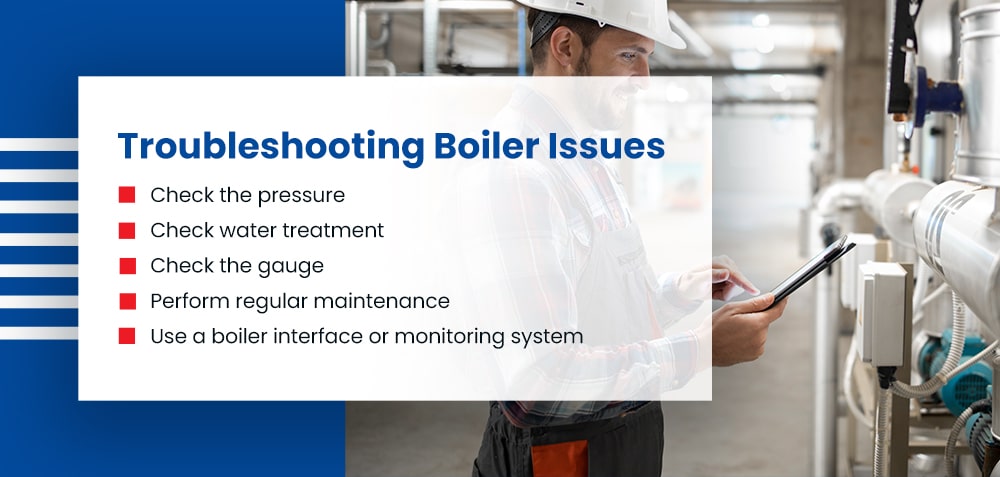
Troubleshooting Boiler Issues
While a boiler technician will know how to troubleshoot an industrial boiler, you may be able to find the source of some boiler problems yourself. Some ways you can troubleshoot boiler issues include:
- Check the pressure: Some boiler issues only require minor adjustments to the temperature or pressure. However, high pressure can lead to significant problems. The proper setting depends on the boiler’s system and usage. You’ll want to check the requirements for your specific boiler before making any adjustments.
- Check water treatment: You should check the boiler water daily to prevent premature leaks and vessel damage. Catching potential leaks or poor water quality early can help prevent significant issues that can damage your boiler.
- Check the gauge: A faulty gauge can sometimes cause issues in your boiler experience. If your boiler is still reaching the appropriate heat and your building is getting heat as usual, you may only need to replace the gauge. However, you’ll want to ensure you get the appropriate gauge for your building or industrial site’s system and boiler.
- Perform regular maintenance: Regular maintenance is one of the best ways to troubleshoot boiler issues. Keeping up with scheduled inspections and regular tuneups can help you catch problems early, saving you time and money. Periodic maintenance also optimizes your boiler’s performance so it can continue to run smoothly for years to come.
- Use a boiler interface or monitoring system: Some boilers have user-friendly interfaces that keep track of boiler conditions and notify boiler operators if any readings are irregular. The interface will also provide solutions to some problems so you can fix them as soon as possible. A monitoring system can also report on specific information to help you troubleshoot specific issues, allowing you to fix them before they worsen.
Next Steps
Once you identify the problem, the next essential step is to fix the issue and preserve the health of your boiler. If you’ve found a problem with your boiler, you should contact an expert as soon as possible. A professional can help confirm the issue and provide the proper solutions, optimizing your boiler’s performance while preventing expensive repairs. They can also perform boiler repair quickly and efficiently, ensuring that your boiler will continue to serve for as long as possible.
While a professional is vital for essential repairs, performing regular preventive maintenance can reduce how much you need them. Once your boiler problems are resolved, regular maintenance is crucial to prevent additional issues from occurring. While industrial boilers should follow an annual maintenance schedule, you may need additional maintenance depending on your usage.
Contact McNeil for Boiler Repair
If you’re experiencing trouble with your boiler, McNeil can help. We offer boiler repair services to reduce disruptions and improve your boiler’s efficiency. We can help keep your boiler performing its best, whether it’s electric or gas-powered.
Some of our boiler repair services include refractory repair, maintenance and inspections, boiler cleaning, component and vessel repair or boiler replacement. We can even install a new boiler if it’s time for an upgrade or if the damage has made it impossible to use your current boiler. Contact us today to get started with a free quote!
How Do Commercial Boilers Work?
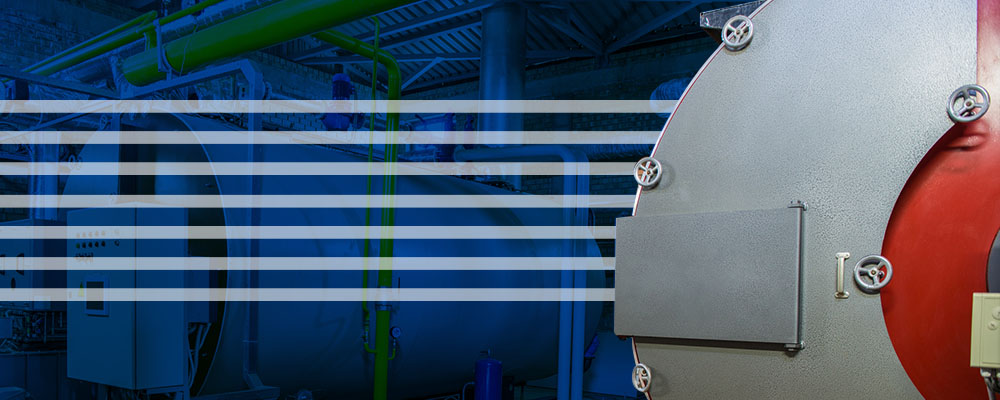
A commercial boiler contains water and transfers heat from a fuel source, such as gas, oil or coal, into steam. The steam is piped to a specific location, allowing it to run equipment, sterilize, steam-clean or provide heat. These boilers are essential to transfer heat energy from one place in your business to another, allowing everything to operate efficiently.
Some commercial boilers use an open system, which allows the steam to return to water form and be reused for different functions. Other boilers run on a closed system, meaning they don’t return the steam to water where it can be reused.
Below, you’ll learn more about how industrial boilers work, the types of boilers and other high-pressure steam boiler basics to help you operate your building’s equipment effectively.
Parts of a Commercial Boiler
Generally, commercial boilers contain the same parts and components essential for effective heating. Some of the standard components of a commercial boiler include:
- Burner: The burner is responsible for providing the flames that heat the water in the vessel. The burner helps create a mixture of fuel and oxygen, allowing the fire to burn efficiently and consistently.
- Combustion chamber: This is the area in the boiler where fuel burns to assist with heating the water. The combustion chamber is where the burners are located and is designed as a secure and safe location for the combustion of volatile fuel at high temperatures. Typically, combustion chambers are made from steel, cast iron or other heavy-duty metals.
- Heat exchanger: This vital component transfers the burners’ heat to the water, allowing it to create steam. Heat exchangers are usually made of copper, steel, cast iron or heavy-duty metal.
- Exhaust stack: This component is also called the flue. It consists of a series of pipes that carry exhaust fumes away from your facility’s interior and outside. An exhaust stack must be carefully constructed to ensure toxic fumes, such as carbon monoxide, are safely removed from your facility’s interior.
- Controls: System controls are an essential part of a commercial boiler, allowing you to set the water temperature, internal pressure, ignition, and fuel and air supply mixtures. You can control how often your burner fires, the rate at which your fuel is used and the quality of the fuel and oxygen mixture. The controls have safety features, allowing you to ensure your system stays operational.
All of these components are essential to a boiler, allowing it to operate safely and efficiently within your business. Without one of these components, your boiler couldn’t provide heating or other essential functions to your commercial enterprise.
How a Commercial Boiler Operates
There are different commercial boilers you can use. However, most boilers work similarly, using burning fuel or electricity to create heat and provide a hot water supply to a building. Depending on the type of system, the boiler may produce steam or hot water, which is then circulated in the pipes within a commercial facility.
Electric coils or fuel burners create heat in a boiler, which is transferred to the water from the heat exchanger. The hot water or steam travels through pipes within the building to the designated area. The water or steam enters the radiators of other heating systems in the building to disperse the warmth, allowing you to keep a space at your desired temperature.
The end goal of a commercial boiler is to produce consistent heat within a commercial building, whether it’s an office, medical facility, apartment complex or school.
Commercial Boiler Maintenance and Safety Tips
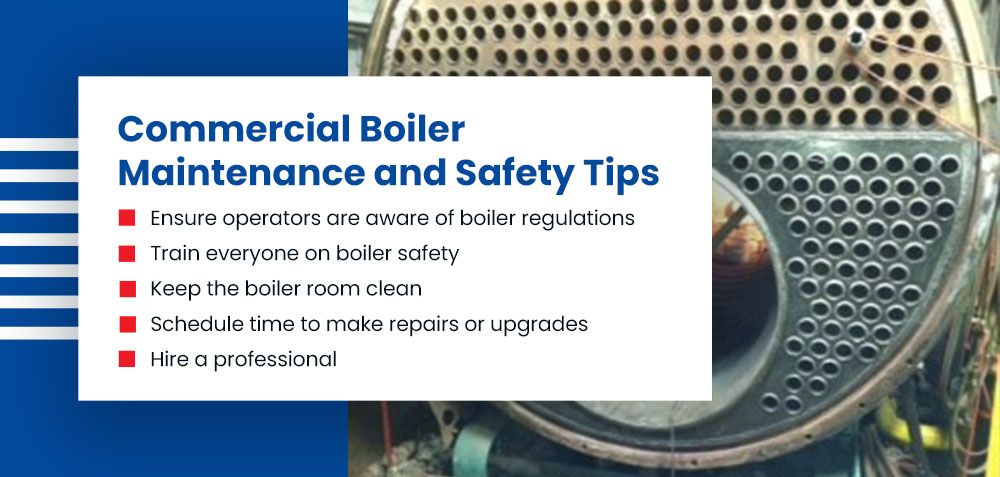
Remember that boilers contain steam or hot water under high pressure, so boiler maintenance is essential to sustain your boiler’s life span. You must take the proper steps to ensure your boiler stays clean and works correctly.
Hot water or steam leaks can cause significant damage or injuries. In some cases, boilers can explode when not adequately maintained, creating the potential for severe injuries or death.
You can follow some of the tips below to keep your boiler properly maintained:
- Ensure operators are aware of boiler regulations: Boiler operation regulations vary by state. For example, most states require your boiler to be inspected yearly, but some don’t. You should make any rules or regulations available to anyone who comes in contact with the boiler to ensure they follow protocol.
- Train everyone on boiler safety: While boiler explosions are rare, they can still happen. It’s essential to train operators on boiler safety, so they know what to look for, including temperature and water or pressure levels. They should also be able to spot signs of corrosion to ensure it’s handled correctly and quickly.
- Keep the boiler room clean: An unorganized or dirty boiler room can create a hazard. You also don’t want to store any flammable materials in a boiler room for the same reason. You should also consider restricting access to the boiler room to technicians and operators who have training in basic boiler safety so you don’t risk injuries and the area stays clean.
- Schedule time to make repairs or upgrades: A boiler requires repairs and upgrades throughout its lifetime. You may need to schedule some downtime for these repairs or upgrades, which means you can use rental boilers while yours is being repaired or upgraded. Even with a rental boiler, you’ll still need to inspect it regularly to ensure everything is working.
- Hire a professional: You should hire a professional to conduct your maintenance and repairs to ensure your boiler is taken care of properly. Professionals have the experience and knowledge to perform high-quality maintenance and repairs when necessary efficiently.
Schedule Boiler Installation or Repair With McNeil
If you need professional help with boiler installation or repairs, McNeil is here to help. We offer high-quality boiler installation services to help you install complex equipment that’s efficient and safe for your commercial processes.
We also offer boiler repair services when your boiler needs maintenance or repairs for specific components. We can work on all commercial boilers, whether you use electricity, gas, hot water or steam.
You can utilize our repair and installation services from any of our Florida, Virginia, or New Jersey facilities. When you choose us, you can rest assured we’ll exceed your expectations and help you keep your commercial operations functional.
Contact us today to learn more about our boiler services or get a quote!
Boiler Maintenance Checklist
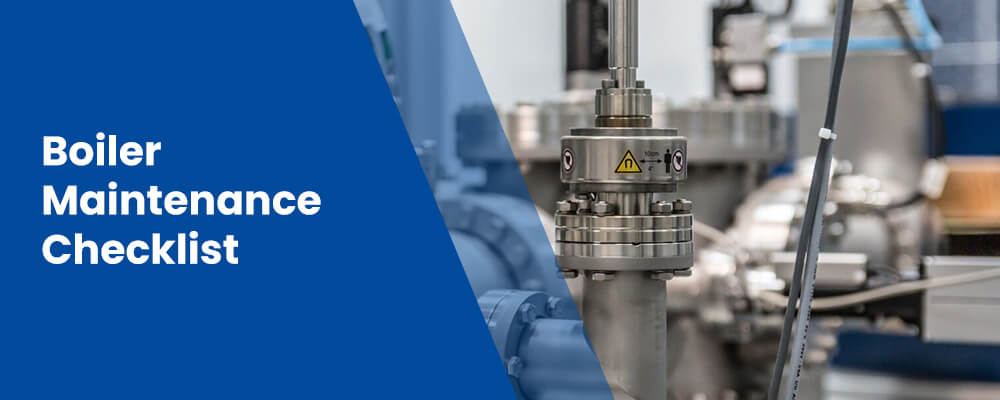
When was the last time your boiler was checked? If you can’t remember, it’s probably time to schedule some routine boiler maintenance. Just like cars, boilers also need a tuneup every so often. In addition to making sure everything is functioning, scheduling boiler maintenance is the best way to prevent future malfunctions, increasing the longevity of your heating system.
So, how often should you get boiler maintenance, and what exactly needs to be checked during routine maintenance? The following boiler maintenance checklist will provide all of the information you need to ensure your heating system is running at its peak for years to come.
What Requires Regular Maintenance on a Boiler?
Every boiler system has various parts and devices that are essential to maintaining the system’s safety and efficiency. To ensure the safe operation of your boiler, all fittings must be checked and maintained properly. In addition, electrical components, combustion ability and safety sensors should also be checked often. There are a lot of elements of a boiler that should be checked, and below is a list of a few of the most important boiler checklist items:
- Pressure gauges: To ensure the safety of those in proximity to a boiler, pressure gauges must give accurate readings. When they don’t, they need to be replaced immediately. The observation of gauges should be done frequently — ideally daily or weekly — and can be tested easily using special equipment.
- Steam traps: These function to remove excess water, air and condensation without removing steam from a steam boiler. When broken, steam traps will either close completely and not remove any condensation, causing erosion and damage to the system, or open completely, allowing for the free flow of steam, wasting energy. These systems should be checked at least several times a year, as they’re integral to the efficiency of boilers.
- Insulation: A significant amount of energy can be saved by periodically checking the boiler system pipe insulation. Improper insulation can unnecessarily cost thousands of extra dollars in energy. Periodically check the insulation using proper technology.
- Valves: There are many valves that control various aspects of a boiler room system, from steam to hot water. Malfunctioning valves can rack up high energy costs, so you should check them weekly using a thermal imager.
- Pumps: A boiler operates through the function of several pumps. These systems should function properly, as a leak or failure of just one pump can shut down the entire boiler system. Different pumps can be tested using a variety of methods and technologies. These tests and checks should be done at least monthly.
How Often Should You Perform Maintenance on a Boiler?
There are various maintenance checks you should perform on a boiler system on a regular basis. These checks range from simply looking at a physical component visibly to taking apart the majority of the system and using equipment to clean and test for more serious issues.
In short, there isn’t a simple answer for how often boiler maintenance should be performed. However, if we dive deeper into what goes into routine maintenance, we can better understand frequency requirements.
What and How Often to Check When Performing Boiler Maintenance
In order to know what to check and how often to do so, it’s important to categorize elements of the boiler system by maintenance importance. While you don’t need to check everything daily, you do have to perform some daily inspections. To more easily understand the various types of maintenance, the components of boiler operation you should check and the frequency of boiler maintenance, let’s break it down by prevalence:
1. General/Daily Maintenance
While you can perform more thorough maintenance on a less frequent basis, there are daily boiler operation checks you should do to ensure the safety and functionality of the boiler system. These checks can be as simple as looking to see that the pressure and temperature are within normal range and checking for any strange noises, smells or leaks, and reporting them if any are found.
2. Weekly Maintenance
On a weekly basis, you can also perform certain preventative maintenance checks. These checks can include checking the burner and draft controls, the air damper on the burner, valve operation and the igniter. Additionally, you can perform tests to make sure the system has an appropriate response to flame failure, shutdowns and other situations.
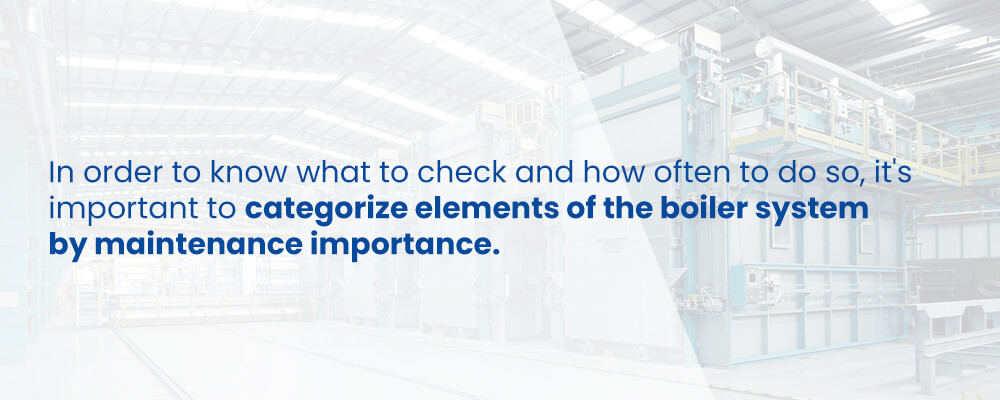
3. Monthly Maintenance
If you’re already performing daily and weekly maintenance checks, your monthly boiler maintenance can be more detail-oriented. When doing monthly maintenance, test limit and flame detection controls, check blowdown and observe floor drains and air inlet screens to rule out any issues with obstruction.
4. Yearly Maintenance
If you can’t perform routine maintenance for your boiler room more frequently, you must complete annual boiler maintenance. During this maintenance, a licensed professional should inspect the heating system, performing several rigorous tests to verify the functionality and safety of the boiler.
The LWCO and ALWCO should be disassembled and checked for blockages, corrosion and defects. Additionally, settings should be checked for accuracy — if not reset — and the fire side should be checked for soot and damage and the water side should be checked for corrosion. Clean the entire boiler inside and out, as well.
Why Follow Maintenance Best Practices
If your boiler is working correctly, you may be wondering why it’s recommended to perform maintenance so frequently. When thinking about boiler and heating system maintenance, it’s important to remember the main purpose of boilers. This is heavy equipment, often responsible for heating the entirety of large buildings. These systems operate under extreme temperatures and working conditions.
Therefore, it’s necessary to ensure your boiler is subject to routine maintenance to guarantee reliability and safety. There are many reasons for and benefits to frequent boiler operation maintenance, including:
- Reliability: Depending on the facility where a boiler is housed, it may be in charge of heating a building full of people, such as a school, or responsible for the operation of machinery for an industrial processing operation. No matter what purpose a boiler has, it’s necessary to have a reliable source of heat and power at all times to maintain regular operations. Routine boiler maintenance can ensure all systems operate correctly, preventing any downtime or other issues.
- Efficiency: All machines are subject to wear and tear, and although it may not seem like a problem, minor issues like leaks or corrosion can lead to more fuel usage, costing you more money than necessary and causing larger problems. The more frequently your boiler is checked, the less often these problems will occur.
- Longevity: Small problems build up over time and can eventually lead to premature wear or breakage of the heating system. Breaks can also occur in individual parts, causing you to purchase a new system or replace an expensive part. Frequent boiler system checks can prevent these decisions from being made in the first place — routine maintenance is the best way to increase the longevity of your heating system.
- Safety: While longevity and efficiency are important, the biggest concern when it comes to boiler failures is the safety of others. There are usually a significant number of people in buildings with boiler systems, so any breakdowns could potentially endanger the lives of hundreds of people. By inspecting your boiler operation routinely, you can ensure that the system meets legal requirements and keeps your workers safe.
It’s essential to all aspects of your operation that your heating system is functioning properly. The proven way to optimize all of these important elements is through routine boiler maintenance. Performing regular inspections of equipment can ensure you can continue operations as normal while making sure workers are safe for years to come.
Contact McNeil Today for Boiler Maintenance Services
At McNeil, we provide high-quality materials and customer service for all radiant heat system management needs. Whether you need new refractory shapes or an entirely new boiler room operation, we’re ready and willing to help whenever you need it. Keep your operation up and running with McNeil’s maintenance services — whether it’s monthly or yearly tuneups, we’ll do what it takes to preserve your steam boilers or gas boilers.
Contact us today to learn more about our boiler maintenance and installation services and how they can help you.
Maintenance In Progress: Our Team at Work
